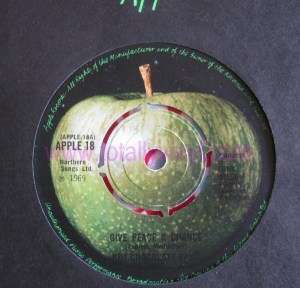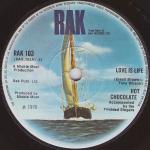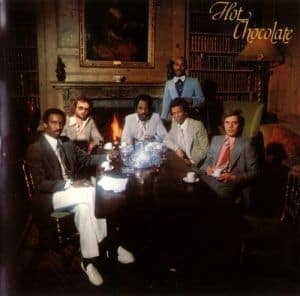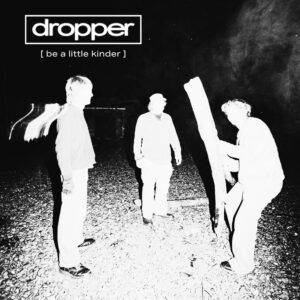Hot Chocolate: Every 1’s A Winner! (Interview)
English hitmakers Hot Chocolate will perform at Auckland’s Bruce Mason Centre tomorrow night and then move on to Wellington on Wednesday. Although singer Errol Brown is long gone, the core of the group…guitarist Harvey Hinsley, bassist Patrick Olive and drummer Tony Conner remain in tact. The band formed in 1968 and went on to have a string of hits including Emma, Brother Louie, Every 1″s A Winner and You Sexy Thing. In fact, the band proudly boasts that they have had a least one hit every year from 1970 through 1984. The 13th Floor’s Marty Duda recently spoke to Patrick Olive about making thos hits with legendary producer Mickie Most.
Click here to listen to the interview:
Or read a transcription of the interview here:
MD: Have you played in New Zealand before or would this be your first time?
PO: We came to New Zealand 28 years ago.
MD: 28 years ago?
PO: 28 years ago.
MD: It was barely a country here at that time.
PO: And we’re looking forward to coming back again very, very much.
MD: Do you remember anything of your first trip here or most previous trip?
PO: Yeah. I remember Whanganui, Rotorua, New Plymouth.
MD: Yup.
PO: Christchurch, windy Wellington, Dunedin.
MD: Yeah Dunedin is right. You’re doing very well.
PO: Christchurch, yeah, I remember. Well how can you forget the sulphur in Rotorua.
MD: Right. This is true.
PO: It’s a fragrance that stays with you for years.
MD: Fantastic. Alrighty. Well I was hoping I could just ask you some questions about Hot Chocolate and kind of historical information about the band because I’m kind of a musicologist and I’m interested in how these things happened over time. So if you’ll bear with me, first of all, I know that you formed in 1968, correct?
PO: Yes, we did, yes, indeed.
MD: And when you initially got together, what was your idea as far as how you wanted the group to sound? What kind of music were you, I mean, cause’ 68, things were very different then musically than, you know, 1978 or the 80s or now.
PO: Well first of all, we got together half-heartedly. We were just sort of like young guys together, what we wanted to do is to help to unite black people and white people…see the world as one being rather than in colour. And we put some black and white people together and then decided to sing songs and hope that people would sing along with us and enjoy themselves. We didn’t think we would have got as far as we have done. So we have made it.
MD: Was there some resistance to the idea of a racially mixed group at that time?
PO: No not at all no. I think people, a lot of people welcomed the idea. That’s one of the reasons after in 40 odd years we’re still in existence.
MD: Right, right.
PO: I think we’ve brought along a lot of harmony together between black and white people. So I must say, we were the ambassadors of racial get together. Yeah.
MD: And from what I understand, your first brush with fame involved Apple Records and The Beatles and your reggae version of a John Lennon song.
 PO: Yes. Yeah again we did that as a laugh, you know, we thought, we’d give it a, we’d do our own make on that song and see what happens and we did and fortunately for us they liked it and gave us a release on the Apple Label and yeah. I got a mighty fat check of $9.
PO: Yes. Yeah again we did that as a laugh, you know, we thought, we’d give it a, we’d do our own make on that song and see what happens and we did and fortunately for us they liked it and gave us a release on the Apple Label and yeah. I got a mighty fat check of $9.
MD: Whoah!
PO: 9 US dollars for my effort. But it was a good start.
MD: And were The Beatles themselves involved in the situation or were you just dealing with office people?
PO: The office people… and John Lennon quite liked the song as well because he thought it was different.
MD: Right.
PO: So office people and John Lennon put together are responsible, I’d say, for us being 60% or 70%…
MD: Yeah.
PO: …of us being where we are today.
MD: And when did you start working with Mickie Most?
PO: In the same year because after that sort of a situation, the writers in the band then decided to pick some songs, they thought well we’ve had one door open and it was a good CV for us to have been accepted by The Beatles and to have a record released on that.
MD: Right.
PO: I went to Mickie Most with some songs for us, but he, he saw a few of them and decided, ‘ right I’m gonna have this for Herman’s Hermits, I’m gonna have this for Mary Hopkin, I’m gonna have this for Julie Felix and this one you can have’. It was a reggae song our first big hit was Love Is Life, which was…the original take on it was a reggae take and we decided to rearrange it and turn it into the pop phenomena that it eventually became.
 MD: Right. And I’m curious about Mickie Most because he’s one of those guys, you know, you see his name on records and you know he’s been around, hHe’s produced tonnes of records, but you never really hear much about what he actually did. In the studio, what did he contribute when you guys were there cutting these records?
MD: Right. And I’m curious about Mickie Most because he’s one of those guys, you know, you see his name on records and you know he’s been around, hHe’s produced tonnes of records, but you never really hear much about what he actually did. In the studio, what did he contribute when you guys were there cutting these records?
PO: He had something, he had a gift. He could tell if a record would be a hit, just by hearing it for about 3 seconds.
MD: Right.
PO: Some people are possessed, gifted like that, and that’s a hit record and I’m going to do it. He had very good engineers, he had a very good recording studio and he had a very good band in Hot Chocolate, but he was a very, very exciting person to work with.
MD: And when you were actually recording, did he give a lot of direction to the band as far as what you should be doing?
PO: Yeah because he thinks, ‘right this song could do with a lot of brass arrangement or string arrangement’ and he’s gonna arrange for the string section to come in and then a brass section and yeah, m he gives a lot of directions. Some of the directions he gave us, we didn’t quite like but then he proved to us that he knew what he was talking about. He knew the right direction for us.
MD: Now, I don’t know if you can tell from my accent, but I’m American and my first exposure to your music was through songs of yours that had been recorded by other people. You Could’ve Been A Lady I think was done by April Wine and Brother Louie by Stories. Were you worried that your songs were kind of being taken by other groups and getting exposure?
PO: Yeah because Mickie Most took it to America to Big Tree, well, Atlantic Records, to get a deal on there.
MD: Yeah.
PO: And they decided, ‘well we’ve got artists, who would suit these types of songs’, so they jumped on it. We were a little bit disappointed that the other people used it instead but we benefited from it because the writers, the people that wrote the songs, did get the royalties they deserved. But it would have been nicer had we had the hits with them.
MD: Yeah. But eventually you did get hits in The States. So I guess it all worked out for the best.
PO: Well Emma, Emma was a big, big seller for us. We got like gold status with that, we got a gold achievement for sales of over like 3 million records.
MD: Right. I remember it well.
PO: Oh right, thank you. Good man, good man.
MD: I have a copy of it sitting in my, on my shelf right now.
PO: You sound as though you’re a New Zealand’s answer to Paul Gambaccini.
MD: Oh, I don’t know, that’s quite a…
PO: He’s an American guy who lives in England and what he doesn’t know about music and recording and producers is nobody’s business.
 MD: Well this is how I find out, I ask you guys. One thing I find really interesting is the fact that right in the middle of everything in 1975, you, yourself switched from being a percussionist to a bass player for the band. How did that happen?
MD: Well this is how I find out, I ask you guys. One thing I find really interesting is the fact that right in the middle of everything in 1975, you, yourself switched from being a percussionist to a bass player for the band. How did that happen?
PO: Well I think I was more sort of suited with coming up with the bass lines than I was a percussionist. I wasn’t trained or anything like that, I was just bashing the damn thing and hoping for the best and every time Errol came with a song to be formulated, I used to be miles in the bassline to the bass guitarist. In the end they said, why are you doing this, why don’t, it’d be better if you went on bass guitar and the bass guitarist went on rhythm guitar, so this is all I managed to get on there.
MD: And did that have any effect on the overall sound and the way the band kind of worked…
PO: Yes, because I’m one of those, like, my fingers are like drumsticks and I do really play really hard on the bass guitar and the drummer is a very hard drummer as well so we created that really powerful Hot Chocolate sound that people could hear on records, on recordings.
MD: Right, right. And you guys are unique in the fact that we were able to span such a large amount of time, 15 years with hit records in every year. How difficult was it for you to keep up with the styles that were changing? I mean, there’s a huge difference between the music of 1970 and 1985. Were you conscious of what was going on around you or did you just kinda do what you did and hope that it fit in?
PO: No we just kept our head down and did our own thing because what we did was different anyway, different enough and if anything, other people were trying to catch up with us. So we weren’t trying to catch up with them, we just did what came naturally to us with a sort of a mixture of black and white players. So we got a, we have a, our lead guitarist came from a rock and roll background and the rest of us come, some come from calypso background, some come from reggae background, some came from soul background. So with all that sort of a combination we made a very different noise, a unique noise.
MD: Now speaking of different noises. A friend of mine asked me to ask you about a particular track, I think you guys recorded in ’72…it’s called Go Go Girl?
PO: Yes. (laughing)
MD: Yeah.
PO: I think those were the days when Errol was struggling to come up with a song like that. We’ve never even listened to that song since.
MD: You’ve never listened to it since?
PO: Never played it on stage.
MD: How would you describe it for people who haven’t heard it?
PO: Go Go Girl, I don’t know. I haven’t heard it for a long time. I can’t even tell you how it sounds. I think it was about, remember there was an outfit called a Go-Go skirt.
MD: Right.
PO: Or something like that. So it must have been named after that fashion.
MD: Yeah.
PO: Go Go Girl, Go-Go skirt. I don’t know what he was trying to do, it’s not one of my favourite songs.
MD: Okay. But speaking of which, what is your favourite song then as far as the Hot Chocolate tunes?
PO: My favourite song is a song called Love Is Life because it was our very first big hit.
MD: Right.
PO: The lyrics in that song are very, very poignant…the lyrics and the melody. So when you’ve had a nice meal for the first time, you’ve never had a nice bit of fillet steak and then its happened to you, you’re never likely to forget the taste of that. So Love Is Life was a hit, it was a big hit for us and I’m never likely to forget it so therefore I love it very much because it got me on the road to talking to your good self.
MD: Fair enough. And a similar question… a career highlight, I mean, you guys have been doing this now for, you know, since 1968. Is there something that particularly stands out above everything else that you’d had a chance to do besides, obviously, talking to me.
PO: Well, we’re a lucky band and because of the songs and type of band that we are, we get to perform in front of presidents, chancellor Helmut Kohl…Angela Merkel from the German chancellor.
MD: Right.
PO: And her majesty, The Queen of England.
MD: You played You Sexy Thing in front of The Queen?
PO: Yeah. What was amazing was we were on the stage and I was like in fits of laughter because we started playing Sexy Thing and The Queen and Prince Philip, they were waltzing while we were playing You Sexy Thing.
MD: I love it.
PO: You could well imagine that was a sight for sore eyes.
MD: I’m not sure I need to see that actually. That’s fantastic. So what would you tell folks here in New Zealand to expect, you know, after 28 years your return shows…?
PO: The people in New Zealand should expect very fiery evening. We’d be playing all the hits and more and we’ll make sure that they are thoroughly entertained.
- Greta Van Den Brink – GIMBGTBLBM: 13th Floor New Song Of The Day - 05/12/2025
- Steve Cropper Has Died Age 84: R.I.P. - 04/12/2025
- PRINS – Heaven Or Hell: 13th Floor New Song Of The Day - 04/12/2025
